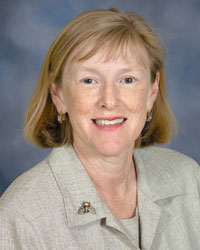 |
Ann Berger, Ph.D. |
Some women are so affected by fatigue during therapy that they decide to end cancer treatment.
“We know how to treat the pain and nausea of cancer treatment, but fatigue — a side effect of chemotherapy that patients tell health professionals bothers them the most — is not routinely addressed,” said Ann Berger, Ph.D, UNMC College of Nursing Professor and Dorothy Hodges Olson Endowed Chair in Nursing. “Reducing fatigue is important because it affects quality of life. Even after treatment is completed, 33 to 40 percent of women report persistent insomnia and fatigue that interferes with their life.
“Some women say they never get back to normal.”
Dr. Berger is principal investigator of a recently completed five-year, $1.5 million study funded by the National Institutes of Health that tested ways to reduce fatigue in patients undergoing breast cancer treatment.
The goal was to determine if fatigue associated with breast cancer chemotherapy treatments could be reduced with a behavioral therapy intervention focused on improving sleep.
The study was the first in depth test of a nursing intervention designed to reduce fatigue during and after chemotherapy without using drugs, she said.
In addition, sleep interventions, which have proven successful in patients with chronic sleep problems and with chronic pain, had not been tested in people with cancer.
Results are available online in the Dec. 17 issue of Psycho-Oncology, a journal that reports on advances in the science and practice of psychosocial care for people with cancer. (Click here to see a copy of Dr. Berger’s study.)
Though study conclusions were not exactly what the researchers expected, sleep quality and quantity improved in many women.
“We thought our sleep intervention would play a major part in reducing fatigue, however we found no statistical significance between the group that received the intervention and the group that didn’t,” Dr. Berger said. “However, we did find that women who followed the sleep intervention benefitted more compared to those who did not follow it. They felt like they got a good night’s sleep.”
In the study, 25 percent of women reported low fatigue, while 50 percent reported moderate fatigue, and 25 percent reported severe fatigue, the kind that puts people in bed, Dr. Berger said.
The study found that adequate sleep isn’t the only answer to reducing fatigue.
“Poor sleep contributes to fatigue, but it’s not the only thing,” Dr. Berger said.
The study provides a benchmark to identify who is at greatest risk for persistent fatigue and sleep problems after treatment, Dr. Berger said.
|
The study also provided study participants with a psychological boost, researchers said.
“After cancer treatment is finished, many feel lost,” Dr. Berger said. “The plan we gave them also served as a strategy to help them get through chemotherapy by reducing fatigue through better quality of sleep. Our visit after chemotherapy ended was a boost for many.
“It’s a challenging time to try to change behavior, but by meeting with patients, we were no doubt able to prevent sleep problems for some of them. It gave them the tools to cope with all the changes in their life.”
Four years after participating in the study, Laura Navin, 56, of Omaha, said she continues to benefit from the study.
“Not only did it help me go through chemo, but it also taught me better sleep practices,” Navin said. “The biggest thing for me is being structured — going to bed and getting up at the same time. Keeping busy like they suggest also helped me to sleep better. The nurse was very supportive. She knew what I was going through.”
The study, which began in 2003, evaluated 220 study participants, ages 19 and older, with stages I, II or III breast cancer. Over one year, study participants were randomly assigned to the sleep intervention group or healthy eating control group, and were evaluated before, during and after receiving chemotherapy.
Both groups kept diaries, completed questionnaires and wore wrist actigraphs (micro-computers that measure sleep and activity patterns) before, during and after chemotherapy treatments. The intervention group was asked to follow a tailored sleep promotion plan.
Dr. Berger, who has done several studies related to fatigue in cancer patients over the past 15 years, said the challenge now is how to integrate what they’ve learned into clinical practice. One thing that’s been done is communicating information to oncology nurses.
“There’s a potential that the intervention can be administered by oncology nurses inexpensively and fairly efficiently — patients won’t necessarily have to see a sleep specialist,” she said. She also hopes the intervention can be tested in patients with other kinds of cancer.
Twelve institutions in Omaha, Fremont, Lincoln and Council Bluffs participated in the study, including UNMC Eppley Cancer Center in Omaha; Oncology-Hematology West, P.C., in the Omaha/Council Bluffs area; and Southeast Nebraska Hematology/Oncology Consultants of Lincoln.
Others involved in the study at UNMC include:
- Julie Chamberlain,
- Mary Pat Roh,
- Trish Fischer,
- Susanna Von Essen, M.D.,
- Brett Kuhn, Ph.D.,
- Lynne Farr, Ph.D. (retired),
- James Lynch, Ph.D., and
- Sangeeta Agrawal.
Tom Davis, Pharm.D., and Anne Kessinger, M.D., of UNMC, and Kathryn Lee, Ph.D., University of California, San Francisco, served as consultants.